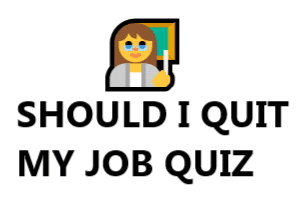Wondering “Should I quit my job?” Take this career quiz guide to assess your situation, explore alternatives, and make a confident decision.

You’re here because part of you is asking, “Should I quit my job?” Maybe you’re feeling stuck, burned out, or just unsure if your current role aligns with your goals.
This guide will help you:
✔ Evaluate your job satisfaction (beyond just a bad day)
✔ Identify red flags that signal it’s time to leave
✔ Explore alternatives (like internal transfers or career pivots)
✔ Make a strategic decision without regrets
Let’s find out if quitting is your best move—or if another solution might work better.
What Does “Should I Quit My Job?” Really Mean?
This question usually stems from one (or more) of these underlying issues:
- Burnout (chronic stress, exhaustion, lack of motivation)
- Mismatched values (company culture clashes with your ethics)
- Career stagnation (no growth opportunities)
- Poor work-life balance (job demands hurt personal life)
- Better opportunities elsewhere (higher pay, remote work, etc.)
Before deciding, it’s crucial to diagnose the root problem.
Key Signs It’s Time to Quit Your Job
🚩 1. You’re Chronically Unhappy or Stressed
- You dread Sundays (or even daily work tasks).
- Small frustrations feel unbearable.
- Your mental/physical health is declining.
🚩 2. Your Values Clash with the Company’s
- You disagree with leadership decisions.
- The work environment feels toxic.
- Ethical concerns keep you up at night.
🚩 3. There’s No Room for Growth
- Promotions are blocked.
- You’ve stopped learning new skills.
- Your salary hasn’t increased in years.
🚩 4. Your Skills Are Wasted
- You’re overqualified for your tasks.
- Your strengths aren’t utilized.
- You feel unchallenged.
🚩 5. You Have a Better Opportunity Lined Up
- Another offer aligns better with your goals.
- You’ve secured financial stability (emergency fund, new job).
Should You Quit? A Self-Assessment Quiz
Ask yourself these 5 critical questions:
- Have I given this job a fair chance? (Less than 6 months? Try adjusting first.)
- Is the problem fixable? (Can you talk to HR, switch teams, or adjust workload?)
- Do I have a financial safety net? (3–6 months of savings?)
- What’s my next step if I quit? (Another job, career change, or break?)
- Will quitting improve my long-term happiness? (Or is this a temporary slump?)
👉 If most answers lean toward “yes,” quitting may be the right call.
Alternatives to Quitting (Try These First!)
Before resigning, consider:
🔄 1. Negotiate Changes
- Ask for remote work, flexible hours, or a raise.
- Propose a new role or project that excites you.
🔄 2. Transfer Internally
- Move to a different department with better culture.
- Shadow another team to explore options.
🔄 3. Take a Leave of Absence
- Use FMLA or a sabbatical to recharge.
- Travel, upskill, or volunteer to gain clarity.
🔄 4. Shift Your Mindset
- Is this a short-term challenge you can push through?
- Can you set boundaries to reduce stress?
How to Quit Your Job the Right Way
If you decide to leave, do it professionally:
- Secure a new job first (unless health/safety is at risk).
- Give proper notice (2+ weeks, unless contract says otherwise).
- Write a resignation letter (keep it brief and grateful).
- Exit gracefully (train replacements, tie up loose ends).
- Stay connected (LinkedIn recommendations help future opportunities).
FAQs About Quitting Your Job
❓ “Is it normal to feel guilty about quitting?”
✅ Yes! Loyalty is natural, but your well-being comes first.
❓ “Should I quit without another job lined up?”
⚠ Risky, but sometimes necessary (e.g., toxic environments). Have savings first!
❓ “How do I explain quitting in future interviews?”
💡 Frame it positively: “I wanted to pursue growth in [X skill/industry].”
Final Verdict: Should You Quit?
Only you can decide—but if:
✔ Your health/happiness is suffering
✔ No fixes are possible
✔ You have a plan for what’s next
…then yes, it may be time to move on.
Still unsure? Retake our quiz or talk to a career coach for personalized advice.
What’s your biggest hesitation about quitting? Share below—we’ll help you weigh the pros and cons!
